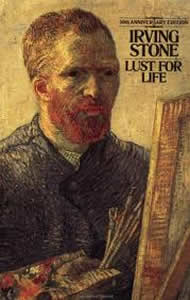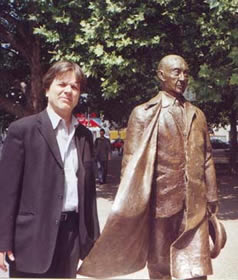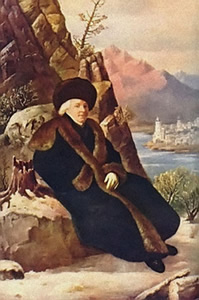De Amerikaanse schrijver Irving Stone werd geboren op 14 juli 1903 in San Francisco. Zie ook alle tags voor Irving Stone op dit blog.
Uit: Lust for Life
“First, we think all truth is beautiful, no matter how hideous its face may seem. We accept all of nature, without any repudiation. We believe there is more beauty in a harsh truth than in a pretty lie, more poetry in earthiness than in all the salons of Paris. We think pain is good because it is the most profound of all human feelings. We think sex is beautiful even when portrayed by a harlot and a pimp. We put character above ugliness, pain above prettiness and hard, crude reality above all the wealth in France. We accept life in its entirety without making moral judgments. We think the prostitute is as good as the countess, the concierge as good as the general, the peasant as good as the cabinet minister, for they all fit into the pattern of nature and are woven into the design of life!”
(…)
“I cannot draw a human figure if I don’t know the order of his bones, muscles or tendons. Same is that I cannot draw a human face if I don’t know what’s going on his mind and heart. In order to paint life one must understand not only anatomy, but what people feel and think about the world they live in. The painter who knows his own craft and nothing else will turn out to be a very superficial artist.”
(…)
“The paintings that laughed at him merrily from the walls were like nothing he had ever seen or dreamed of. Gone were the flat, thin surfaces. Gone was the sentimental sobriety. Gone was the brown gravy in which Europe had been bathing its pictures for centuries. Here were pictures riotously mad with the sun. With light and air and throbbing vivacity. Paintings of ballet girls backstage, done in primitive reds, greens, and blues thrown next to each other irreverantly. He looked at the signature. Degas.”

Cover
De Duitse schrijver Volker Kaminski werd op 14 juli 1958 in Karlsruhe geboren. Zie ook alle tags voor Volker Kaminski op dit blog.
Uit: Wie bei Tatort
„Stein blickt seinem Chef ins Gesicht.
Der steht da, die rechte Hand auf den Schreibtisch gestützt, den Kopf weit vorgebeugt. Er hat den Blick direkt auf Stein gerichtet, müde sieht er ihn an, als hätte er nicht viel Hoffnung für ihn.
Wenn Wintermann redet, klingt es wie ein Automat, findet Stein. Er zerhackt Wörter, betont die falschen Silben, legt Pausen an unpassenden Stellen ein und wird plötzlich so laut, dass alle im Büro seine Stimme hören.
Wintermann ist verärgert, und dann kann er sich nicht bremsen. Er ist mit Steins Leistungen unzufrieden, seine Abschlüsse sind ungenügend, er erwartet deutlich höhere Quoten. Was macht Stein eigentlich den ganzen Tag? Stein fällt immer erst hinterher ein, was er dem Chef antworten könnte. Endlich ist Wintermann fertig und geht mit beleidigt wirkenden Bewegungen weg.
Stein versucht weiterzuarbeiten, aber er merkt, dass sich sein Magen verkrampft. Es sind Schmerzen, die er kaum verbergen kann.
Letzte Woche hatte er einen Zusammenbruch in der Kantine. Er balancierte gerade einen Teller Erbsensuppe auf seinem Tablett, als ihm plötzlich schwarz vor Augen wurde. Trotz dieses Alarmsignals ließ er sich nicht krankschreiben.
Er zieht die oberste Schublade auf und beginnt darin zu kramen. Dann schiebt er sich zwei Filmtabletten in den Mund. Das Unangenehme ist, dass er sich dabei so alt vorkommt; Tabletten schlucken bedeutet Schwäche. Wintermann ist schuld, dass Stein Pillen nehmen muss. Er wird sich nie daran gewöhnen können. Das weiß er.
Wintermann bleibt in den nächsten Stunden unsichtbar. Während Stein mit Kunden telefoniert, sich über die Tastatur beugt, seitenlange Verträge studiert, sieht er zwischendurch immer wieder auf die Tür mit dem blaugelbroten Pferdeaquarell. Er müsste zu Wintermann gehen und ihm die Meinung sagen. Er stellt sich vor, wie er die Tür aufmacht und an seinen klobigen Schreibtisch tritt. Aber dann wäre er auf Wintermanns Terrain und es würde ihm bestimmt wieder nichts einfallen, wenn die Automatenstimme losgeht.“

Hier naast een standbeeld van Konrad Adenauer in Berlijn
De Italiaanse schrijfster Natalia Ginzburg werd geboren op 14 juli 1916 in Palermo. Zie ook alle tags voor Natalia Ginzburg op dit blog.
Uit: The Little Virtues
“Virginia Woolf said something interesting once about marriage. I can’t track down the quote, unfortunately, but approximately it was that the ordinary days of any long relationship were like plain beads being put on a string, one after another, and then – at a moment when we’re beginning to get impatient, or perhaps after we’ve been impatient for some time – something magical is slipped on the thread, some invaluable, unexpected stone that would be much less beautiful if it were not set off by the beads that came before and the ones that will follow.
This idea is pleasing, but I don’t think it sits comfortably with most people today. Intensity is a more easily celebrated goal: feeling things as strongly as possible for as much of one’s life as possible, diamond after diamond on the string. We could easily be falling in love today – or visiting another country, fighting our old limits, and then sinking ourselves in some strange and exquisite pleasure. Or all at once! – the more intense the better.
I’m not sure which one I believe – neither, entirely – but I know that very few modern writers apply Woolf’s advice to their books. The goal is to dazzle, line by line and page by page, because otherwise the reader – the extraordinarily beautiful creature who has agreed, for some reason, to go on a blind date with us – will get bored and leave. It is the rare writer who considers that the reader’s boredom might actually be a valuable tool in her arsenal. Not cranky and impatient boredom, of course, which we experience when a person’s forced liveliness fails to enchant, but the gentle, lazy variety. This kind of receptive boredom is a valuable state for a writer, because the most profound and surprising truths can be slipped under the table of the reader’s fully engaged consciousness.”

De Franse schrijver en letterkundige Jacques de Lacretelle werd geboren in Cormatin (Saône-et-Loire) op 14 juli 1888. Zie ook alle tags voor Jacques de Lacretelle op dit blog.
Uit: Silbermann
“Il recherchait surtout la compagnie des professeurs. Lorsque le roulement de tambour annonçait la brève pause qui coupe les classes et que tous nous nous précipitions dehors, il n’était pas rare qu’il s’approchât de la chaire d’une manière insinuante ; et ayant soumis habilement une question au professeur, il se mettait à causer avec lui. Puis, il nous regardait rentrer, du haut de l’estrade, avec un air de fierté. Je l’admirais à ces moments, pensant combien à sa place j’eusse été gêné.
On ne tarda pas à s’apercevoir que Sil- bermann était non seulement capable de rester en troisième, mais qu’il prendrait rang probablement parmi les meilleurs élèves. Ses notes, dès le début, furent excellentes et il les mérita autant par son savoir que par son application. Il paraissait doué d’une mémoire s ngulière et récitait toujours ses leçons sans la moindre faute. Il y avait là de quoi m’émerveiller, car, élève médiocre, j’avais une peine particulière à retenir les miennes. J’étais d’une insensibilité totale devant tout texte scolaire ; les mots sur les livres d’étude avaient à mes yeux je ne sais quel vêtement gris, uniforme, qui m’empêchait de distinguer entre eux et de les saisir.
Un jour, pourtant, le voile se déchira, une lumière nouvelle fut jetée sur les choses que j’étudiais ; et ce fut grâce à Silbermann.
C’était en classe de français. La leçon apprise était la première scène d^lphtgénte, Silbermann, interrogé, se leva et commença de réciter:
Oui, c’est Agamemnon, c’est ton rot qui t’éveille,
Viens, reconnais la voix qui frappe ton oreille
Il ne débita point les vers d’une manière soumise et monotone, ainsi que faisaient la plupart des bons élèves.”

De Russische dichter Gavrila Romanovitsj Derzjavin werd geboren in Kazan op 14 juli 1743. Zie ook alle tags voor Gavrila Derzjavin op dit blog.
The Current Of Time’s River
The current of time’s river
Will carry off all human deeds
And sink into oblivion
All peoples, kingdoms and their kings.
And if there’s something that remains
Through sounds of horn and lyre,
It too will disappear into the maw of time
And not avoid the common fate.
On A Bird
A sweet-voiced bird’s been caught.
They squeeze it in a vice-like grip.
The poor thing squeaks and warbles not
But they insist: “O, birdie, sing!

Zie voor nog meer schrijvers van de 14e juli ook mijn eerste blog van vandaag.
